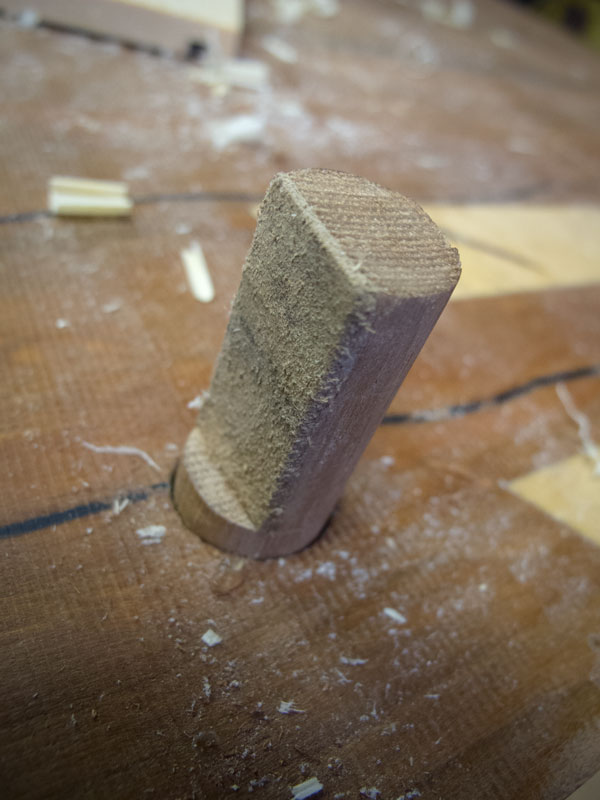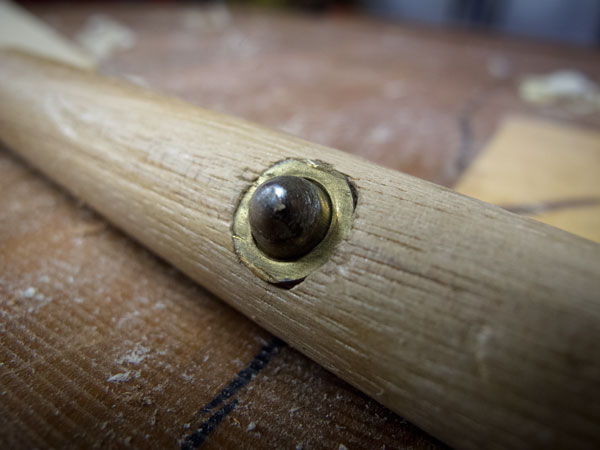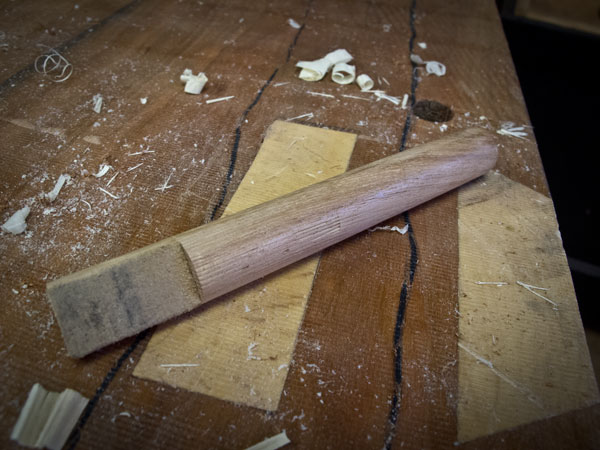We may receive a commission when you use our affiliate links. However, this does not impact our recommendations.
One of the unanswerable questions in woodworking is: What type of bench dog is best?
(Other unanswerables: What does Peter Follansbee hide in his beard? How many puns are possible with the word “rabbet?” Would you like to see my feathered crotch?)
At least on the bench dog question, I have answered it for myself. I prefer a round wooden dog that I make myself.
I’ve had these dogs for many years on my daughter’s French bench, and I can find no fault with them. Here are the details:
• They are made from 3/4”-diameter hickory dowels that I purchased from Midwest Dowel. The dogs are 5” long, which is ideal for the 4”-thick benchtop.
• The dogs have a notch at one end that creates a flat for gripping the work. The notch is 1/4” x 1” long and is angled about 2° or so (on purpose) to help grip the work.
• The notch is lined with a small piece of suede that is glued to the notch. The suede is attached with hide glue or PVA. (I forget which.) Almost any glue will work. The leather prevents the dog from ever marking the work. And it adds to its grip.
• A spring-loaded bullet catch on the shaft of the dog allows it to be quickly and easily moved up and down. When I want them to stay, they stay. These bullet catches are available at my hardware store. Almost any decent store that carries cabinet hardware will stock them.
Why round dogs? They are easier to install on a workbench, especially after assembly. Why hickory? Wooden dogs won’t bang up your tools. Hickory is super tough. Even though you really shouldn’t apply a lot of pressure when clamping your work, the hickory is unlikely to ever break.
And one more thing I like about these dogs: They are cheap and easy to make. You can make one for every hole in your bench, which is something I forgot to do for my daughter’s bench until I found my stash of hickory dowels this morning.
— Christopher Schwarz
Here are some supplies and tools we find essential in our everyday work around the shop. We may receive a commission from sales referred by our links; however, we have carefully selected these products for their usefulness and quality.












Are you using the 5/16th size? http://www.leevalley.com/US/hardware/page.aspx?p=52888&cat=3,41399,41404
I just inherited an old bench and the dogs were replaced with pine and not super useful… Definitely interested in this.
That’s what Elvis was singing. You ain’t nothing but a round dog.
Ps will we see what this young person makes on the bench?
I can’t see from the photo but how far from the end is the bullet catch? Is there another non-violent means of securing it? Isn’t it great that today we get to pay our taxes? ; ^ )
I made a few of these after reading your previous posts. I can attest to the fact that they work great, are dirt cheap, and easy to make.
Another advantage of round dogs is that they will hold non-rectilinear work easily.
A while back, I picked up a bag of something like 100 bullet catches (sans strike plates) for $4.50 or some absurdly small amount of money from Lee Valley
(ed. I just checked my old invoices and it was 100 catches for $6.50. It was also 2008, so… a REALLY long time ago.)
They don’t have them on the website anymore, and it HAS been a while, BUT… I happen to know Lee Valley will pull clearance items from the website when they’re down to just a few left in-stock so they don’t take more orders than they have quantity on-hand. If one were to call Lee Valley customer service and ask if they have any stock left for item #99W6736, one might be able to get a good deal.
I’ve done this before with several different items and have had good results.
And if you don’t have a bunch of suede scrap sitting around, you can get a small bag of it from craft stores (Michael’s comes to mind) for about $5. That should be enough scrap to do a very large number of dogs.
No need to worry about fleas, either!
Hi Chris,
Do they have to be 5″ long? Does I matter which end I put the notch in? How did you arrive at two degrees? Are you sure hickory is the best wood to use?
Sorry I just couldn’t resist.